| Srl | Item |
| 1 |
ID:
125575
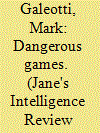

|
|
|
|
|
| Publication |
2013.
|
| Summary/Abstract |
In the run up to the 2014 winter Olympics, Russian security forces are working on disrupting insurgent groups in advance. Mark Galeotti takes a look at what has already been done and what constitutes the biggest threat to a peaceful games.
|
|
|
|
|
|
|
|
|
|
|
|
|
|
|
|
| 2 |
ID:
125103
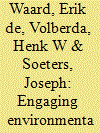

|
|
|
|
|
| Publication |
2013.
|
| Summary/Abstract |
Since the transformation was set in motion to change Western armed forces from large-scale mechanized defensive organizations into smaller agile expeditionary crisis response forces, the call for organizational flexibility has rocketed. Yet, actual research into the key organizational drivers of flexibility has hardly been done. To bridge this gap, the present study has analyzed to what extent modular organizing and organizational sensing have contributed to flexible military crisis response performance. The study uses the Netherlands' armed forces as a representative example of a contemporary Western crisis response organization and empirically draws upon its recent operational experiences. It has uncovered that within most mission contexts, modular organizing acts as a facilitator for the organizational sensing process. Yet, within highly turbulent crisis response missions, organizational sensing becomes the predominant driver, stimulating ad hoc solutions that challenge existing structures, available technology, and standard procedures.
|
|
|
|
|
|
|
|
|
|
|
|
|
|
|
|
| 3 |
ID:
117104
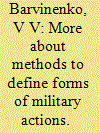

|
|
|
| 4 |
ID:
141749
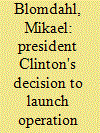

|
|
|
|
|
| Summary/Abstract |
An examination of President Clinton's decision to launch military actions against Iraq in June 1993 is largely absent in professional defense literature. This article represents an attempt to test the descriptive accuracy and further develop the diversionary theory of war. The analysis employs a qualitative framework for diversionary use of force developed by another researcher, Ryan C. Hendrickson. This article finds that empirical support for the diversionary argument in this case is mixed. Two proposals to further develop qualitative tests for diversionary use of force are advanced.
|
|
|
|
|
|
|
|
|
|
|
|
|
|
|
|
| 5 |
ID:
125085
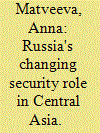

|
|
|
|
|
| Publication |
2013.
|
| Summary/Abstract |
The paper explores Russia's role in security in Central Asia, which analysts interpreted as projection of hegemony. It argues that this role is changing and is shaped by a variety of factors, sometimes acting in contradiction to one another. Domestic agenda is influenced by the danger discourse on drugs and anti-migrant sentiment and urges to detach from Central Asia. Moscow maintains a military presence in the region but is uncertain if it has serious enough stakes to justify a robust approach to security. Refusal to intervene in Kyrgyzstan in 2010 serves as a potent case. Regional organisations echo the non-intervention stance. As a 'cost-benefit' approach to security gains momentum, the paper asks if a policy of selective engagement is emerging when only the issues threatening Russia directly will be addressed. The implication can be a security vacuum in the region, affected by ethnic conflict, inter-state disputes and the consequences of withdrawal from Afghanistan.
|
|
|
|
|
|
|
|
|
|
|
|
|
|
|
|
| 6 |
ID:
125116
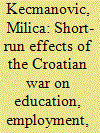

|
|
|
|
|
| Publication |
2013.
|
| Summary/Abstract |
The recent war in Croatia (1991-1995) has had numerous adverse affects on the country and the economy as a whole. This article investigates the effect that the war had on the educational, employment, and earnings trajectories of the 1971 birth cohort of men. This birth cohort was very likely to be drafted into the armed forces. Using data from the Croatian and Slovenian Labour Force Surveys, the author treats the occurrence of the war as a natural experiment and applies the difference-in-difference framework to compare this cohort to adjacent cohorts, women, and respective cohorts in Slovenia, a neighboring country that did not experience war. The war appears to have had a negative effect on educational outcomes but a small positive effect on employment and earnings outcomes of this cohort of men. Croatia's victory in the war may provide an explanation for the observed preferential treatment of draftees in the labor market.
|
|
|
|
|
|
|
|
|
|
|
|
|
|
|
|
| 7 |
ID:
125202
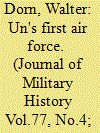

|
|
|
|
|
| Publication |
2013.
|
| Summary/Abstract |
The United Nations Operation in the Congo (ONUC) was created in July 1960 to help the Congolese government quell its army mutiny and reestablish order. After ONUC's mandate was expanded in 1961 to stop the Katanga province's secession, a shooting war developed, in which Katanga paralyzed UN operations with a single armed jet. An aerial "arms race" and open combat followed. In December 1962 ONUC implemented Operation Grand Slam: Swedish jets neutralized Katanga's air force, and the UN's coordinated air-ground manoeuvers forcibly ended the secession. This article uncovers the unprecedented case of air power in UN peacekeeping and evaluates it for twenty-first century lessons.
|
|
|
|
|
|
|
|
|
|
|
|
|
|
|
|